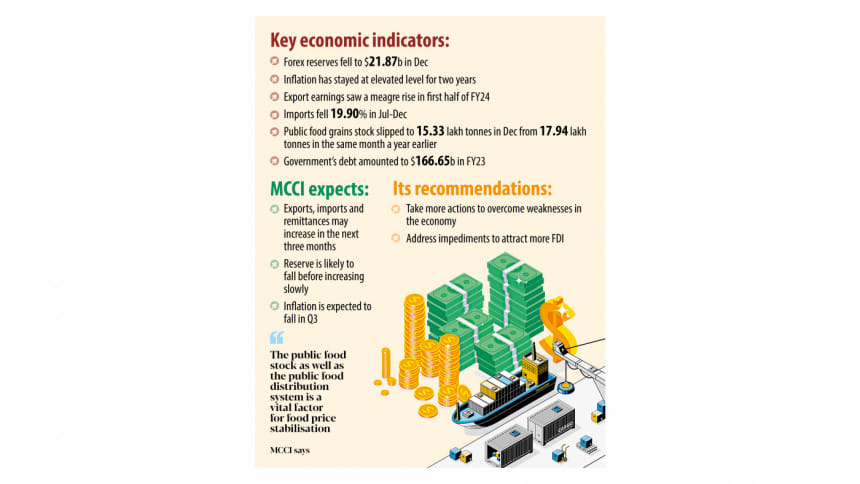Six Indicators signal significant challenges for govt: MCCI

The government is facing significant challenges in as many as six out of nine key economic indicators, said a top chamber yesterday, calling for further actions to improve the scenario.
The parameters are foreign exchange reserves, import volume, domestic debt, export receipts, food stock, and inflation, according to the Metropolitan Chamber of Commerce & Industry, Dhaka (MCCI).
Local economists have attributed persisting global and local adversities to the weaker situation in the areas. In order to overcome the situation, the government has taken quick and decisive measures to address the economic fallout.
"The government also needs to take more actions to stabilise foreign exchange reserves, manage inflation, enhance revenue earnings, ensure proper electricity and gas supply, and improve the food situation," the MCCI said in its review of the economic situation for October-December of the current financial year of 2023-24.
Amid higher outflows against lower inflows, gross foreign exchange reserves fell to $21.87 billion at the end of December. It was $24.75 billion at the end of the last financial year and $40.7 billion in August 2021.
Inflation has stayed at an elevated level for the past two years and surged to a 12-year high in 2022-23.
The rate of inflation decreased to 9.41 percent in December from 9.49 percent in November. Still, it was high because of the supply bottlenecks brought on by the Russia-Ukraine war and the rise in domestic demand, the oldest chamber of the country said.
Merchandise export earnings increased a meagre 0.83 percent to $27.54 billion in July-December of FY24, due mainly to the falling demand for apparel products in the global market for an economic slowdown and Bangladesh's limited product basket.
Customs-based imports decreased by 19.90 percent to $33 billion.
The review said the public food stock is a vital factor for food price stabilisation as well as the public food distribution system. So, the government is procuring food grains from both internal and external sources.
In December, the government's food grains stock was estimated at 15.33 lakh tonnes, which was 17.94 lakh tonnes in the identical month in 2022.
The government's total debt amounted to $166.65 billion in FY23. Of the volume, external debt stood at $74 billion, which is predominantly owed to multilateral and bilateral creditors.
Although the risk of external debt distress and the overall risk of debt distress has remained low for Bangladesh, the persistently low revenue receipts have not only limited the government's ability to spend but are also posing a threat to the country's debt sustainability.
The National Board of Revenue's tax collections grew 13.89 percent year-on-year to Tk 165,629 crore in July-December of FY24 riding on value-added tax receipts. However, the achievement fell short of the government's strategic target by 12.30 percent.
Nevertheless, the MCCI said, the economy showed some signs of improvement in the quarter under review.
"Exports and imports are two important drivers of the economy, and amid the present situation, both areas have done better."
The review said the economy is gradually overcoming the difficulty caused by the Russia-Ukraine crisis. "Therefore, the performances of the selected economic indicators are mixed."
The chamber thinks exports, imports and remittances may increase in the next three months. The foreign exchange reserve is likely to fall due to the repayments of loans before increasing slowly.
Inflation is expected to go down slowly in the third quarter.
The chamber said Bangladesh's low labour costs are generally believed to be attractive to foreign investors, yet they hesitate to make fresh investments in the country.
The factors include underdeveloped infrastructure, the shortage of energy and weak transmission infrastructure, lack of consistency in policy and regulatory frameworks, scarcity of industrial land, corruption, and non-transparent and uneven application of rules and regulations.
"The government needs to address these impediments to attract more FDI and ensure the economic development," the MCCI said.

 For all latest news, follow The Daily Star's Google News channel.
For all latest news, follow The Daily Star's Google News channel. 








Comments